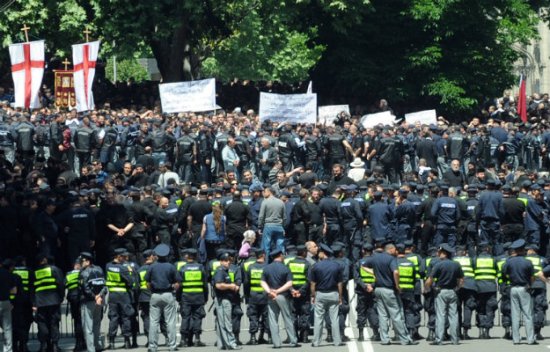07/08/2013 | Writer: Kaos GL
The former Soviet republic of Georgia is contending with the aftermath of an episode of mass violence that took place in May.

Priests Among Violent Attackers
The incident began when members of Georgia’s lesbian, gay, bisexual and transgender community and their supporters obtained a permit to hold a vigil on the steps of parliament. They planned to mark the International Day Against Homophobia on May 17. When some leaders of the Georgian Orthodox Church heard about it, they urged their congregations to come to a counterdemonstration, which was promoted as a peaceful and family-oriented event. When the day came, it was anything but peaceful. Led by Orthodox priests, the crowd overwhelmed the police barrier around the small group of anti-homophobia demonstrators. Video from the clash shows a priest brandishing a stool as a weapon; other priests are heard to curse and yell "Kill them! Kill them!"
Nino Kharchilava was part of a small group of demonstrators that never even made it to the parliament steps. They were surrounded by counterdemonstrators and threatened until police hustled them into a minibus in an effort to get them away from the mob. Kharchilava is a project assistant for the Women’s Initiatives Supporting Group in Tblisi. She says the bus, too, was overwhelmed by attackers, who smashed most of the windows and thrust their hands through the broken glass to get at the demonstrators inside. "One guy was like, hitting [at] me, and I just tried to communicate and tried to say ’What are you doing?’ " she recalls. "And when I saw the blood around, and I couldn’t figure out whether this blood is mine, or not, and then I realized it’s not my blood, it’s their blood." "You know, they were ready to kill themselves [in order to kill] us," Kharchilava says. "It was really insane."
Church Does Not Punish Participants
The Rev. Mikael Botkovali, a spokesman for the Orthodox Church, brought members of his own congregation to the demonstration. On a recent day, he sits in the calm baptistery of his church, surrounded by saints painted in the Byzantine style. Botkovali says the church opposes homosexuality, but it doesn’t seek to interfere with what gay people do in private. Where the faithful must speak out, he says, is when LGBT people seek to spread what he calls "homosexual propaganda." "Religion obliges us to talk to these people and to show them that they’re wrong, they’re sinners," he says. "Even in the Bible, it’s written about these people that, all of them, they will go to hell." But Botkovali condemns the violence and says the priests who led it were rightly punished under civil and church law. When pressed, he concedes that the church punishment consists only of suspending the priests from serving for a while and sending them to a monastery outside the city until they confess their errors. After the violence, Georgia’s prime minister, Bidzina Ivanishvili, said that those who promoted the violence would be punished.

A Test For The Rule Of Law
But gay-rights activist Irakli Vacharadze says that so far, the civil punishment hasn’t been strong enough to show that Georgia’s new government is willing to apply the rule of law to such a popular and powerful institution as the church. Vacharadze is the executive director of an LGBT organization called Identova, or "Identity," and he was at the May 17 demonstration. He says that key members of Georgia’s parliament, including the head of the Committee on Human Rights, have declared themselves subservient to the patriarch of the Orthodox Church. "What does it mean," Vacharadze asks, "when the chair of the human rights committee says that ’our statement on the human rights violations will not go over what the patriarch has said’? It’s a theocracy. It’s quite dangerous. We don’t want to turn Georgia into next Iran."
Lasha Bakradze, the head of the Georgian Literature Museum in Tblisi, helped organize an online petition against homophobic violence. He says more than 12,000 people signed the petition in its first two days online. The mass violence on May 17 isn’t just about sexual orientation and traditional values, Bakradze says, it’s a demonstration of power by extremists who have made their way into the higher levels of the church. "I think that the church in Georgia has shown to the government how powerful [it is] ... and it’s dangerous, and it’s against Georgian statehood," he says. But Archil Kbilashvili, Georgia’s chief prosecutor, says the case is not over, and that priests who were involved in the violence still face charges that could require them to serve jail time. And, he says, no matter what the outcome, the case will serve as a key precedent. "We cannot remember when our prosecution office introduced charges against some spiritual leaders," Kbilashvili says. LGBT rights groups say they’re still waiting for proof that the government will hold those spiritual leaders to account under the law. (NPR)
Tags: life

